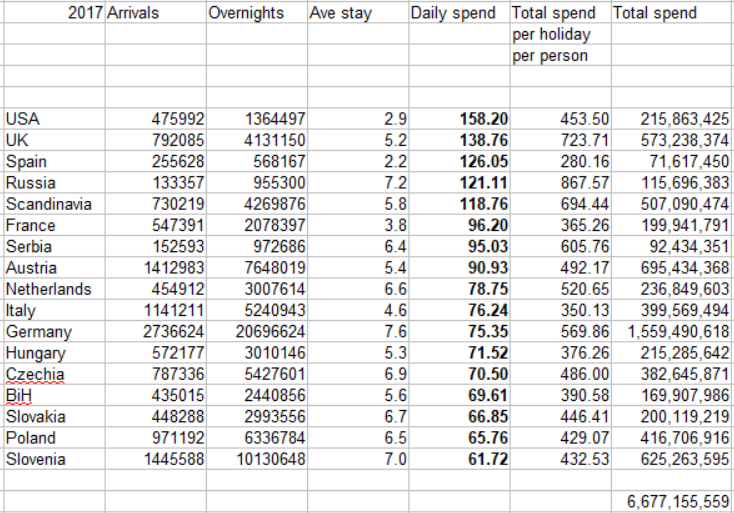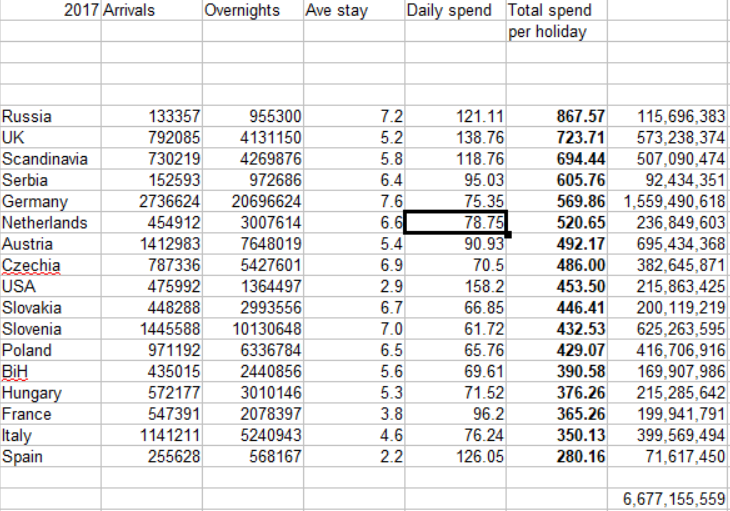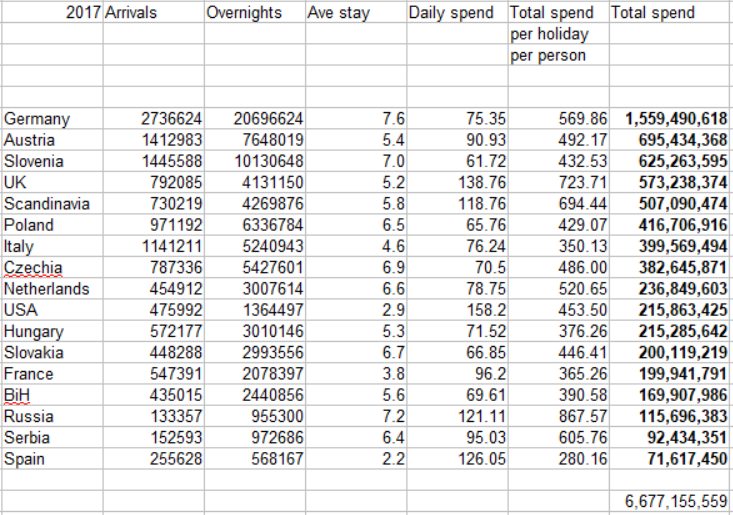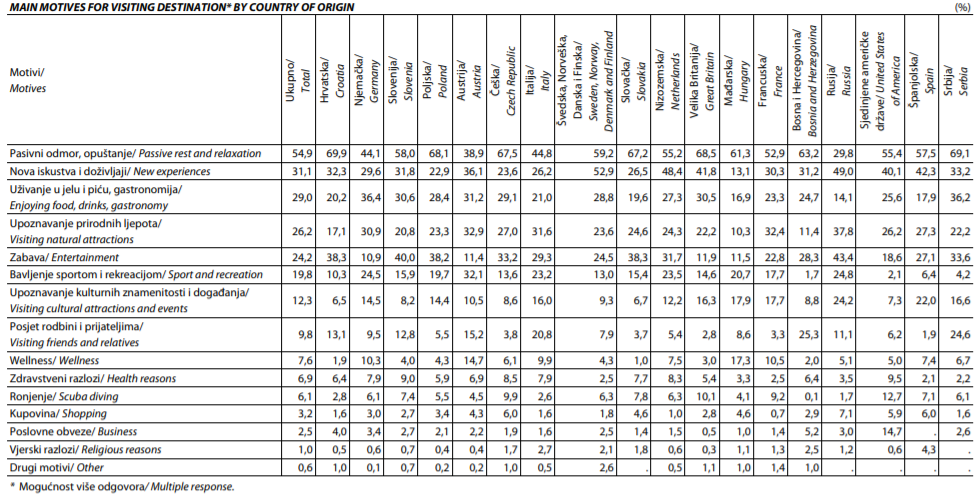November 23, 2019 - Who are the biggest Croatian tourism spenders? The answers might surprise you. An analysis based on official numbers and an official survey.
Numbers, numbers, numbers - the only currency which seems to matter with Croatia's official tourism strategy.
20 million tourists this year, 100 million overnights, more than 800,000 private accommodation beds for rent (up 100% on 2010) - the Numbers God is receiving sufficient numeric libations at the Temple of Numbers.
We mere mortals are usually fed only the numbers we need to be told - basically how well it is going. When the Adriatic speaks after a strong Jugo storm, washing up Albanian but also Croatian trash, one wonders at the environmental numbers, cost and devastation. But only for a moment, for that would take us off message from the celebrations at the Temple of Numbers.
Not being part of the system, and not really knowing my around the system, I have always struggled to find the latest available reports and statistics. Earlier today, I did what was - for me - a reasonably interesting article on the last in-depth Croatian tourism survey that I am aware of, which had some rather interesting and surprising conclusions.
The data, based on tourist surveys from 20 key markets (please note that Scandinavia was lumped into one and includes Norway, Denmark, Sweden and - incorrectly - Finland, not my doing) on everything from reasons for choosing Croatia and activities undertaken to length of stay and average spend. Some really useful information from the summer of 2017. The survey is only conducted every three years apparently, so this is the latest one.
It got me thinking. If we had data on average spend and length of stay per country, then we cross-referenced them with the official statistics, what could we learn? Quite a lot, and once more the results were extremely surprising. For consistency, I used 2017 official statistics, the same year as the survey. The numbers below are my extrapolation of the survey findings blended with the official statistics.
According to the survey, the biggest daily spenders per day were from the USA, more than twice what the Germans spent. Only the UK, Spain, Russia and that Scandinavia averaged over 100 euro a day. And it was a surprise to see Serbia in seventh, completely outspending the Germans and most of the rest of Western Europe.
I then matched up the daily spend per country with the average length of stay. A big surprise - the Russians spend the most money on holiday in Croatia, UK, Scandinavia, with Serbia in fourth.
When it comes to total spend, however, a combination of number of visitors, length of stay and average daily spend, nobody comes close to the Germans. Despite their relatively low daily spend, they drop almost three times as many euro overall as their closest rival, Austria.
Now look in the column of the daily spend, above. If we can get more Americans, Russians and Spaniards, the revenues are going to increase with less tourists. This is already happening with the important USA market, and from memory, there are about 720,000 tourists from the USA this year, a 50% increase on these 2017 numbers. In the case of Spain, an increase in visitors and length of stay would do wonders.
But the biggest lesson, perhaps, was this detailed look at the motivations for travel to Croatia. If we look at the Russians, they are the LEAST interested in the most popular activity, Passive Rest and Relaxation (aka beach tourism), the MOST interested in new experiences, sport and recreation, visiting natural attractions, entertainment, and visiting cultural attractions and events.
Talk about a dream client! Not interested in the one thing which is the biggest pressure point in Croatian tournament, but keen to explore all the other options we have in abundance.
I am not advocating we make Russia our number one market focus (although I do wince about that lost opportunity with the World Cup reading these stats...), but the point is that there is high-spending interest in Croatian tourism away from the pressure points. And the more high-spending tourists doing different activities all over the countries, the less the reliance on endangering the Adriatic jewel.
I am sure our tourism chiefs have all this under control.
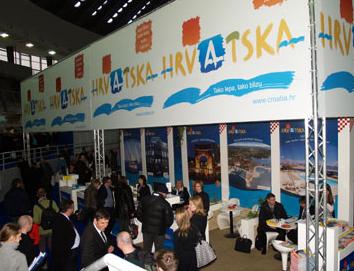
(Croatia was the official partner country of the Belgrade Tourism Fair in 2011 - Photo credit Croatian Ministry of Tourism)
A word on Serbia and its relationship with Croatian tourism. Having lived here for 17 years and having just come back from the Vukovar Remembrance Day parade (you can read the impressions of a foreign resident of this most intense and emotional day here). I am fully aware of the various Croatian feelings towards tourists from Serbia. The official messages are very conflicting. Currently, the Croatian National Tourist Board informed me that Serbia is no longer a target market for Croatia.
As recently as 2011, it was very much so, for as you can see from the Croatian stand at the 2011 Belgrade Tourism Fair, Croatia was the official partner country.
Under an article entitled, Croats Helping Serbian Tourism, and Serbs Croats, here is the official Croatian position on a tourism market seemingly completely abandoned today:
The International Tourism Fair (ITTFA) held in Belgrade, in which Croatia participates as a partner country, was opened today in the Serbian capital, and by February 27th, on 32,000 square meters [of space], around 900 exhibitors from 43 countries will be present.
At the 33rd Belgrade Tourism Fair, Croatia will be specially presented as a tourist destination. The State Secretary of the Croatian Ministry of Tourism, Ivo Mujo, stated that Croatia's arrival [presentation] in Belgrade, after accepting the invitation to become a partner country of the Belgrade Fair this year, was a new dimension of cooperation.
Serbian guests are important to us in Croatia, but this isn't a one-way process because more and more Croatian tourists are going to Serbia - said Mujo at the opening of this fair. He stressed that he believes that this year's presentation of Croatia in Belgrade will bring Croatia and Serbia closer in the tourist(ic) sense.
The 2011 Belgrade Tourism Fair, with Croatia as the main sponsor, took place 26 years after the end of the war. The 2018 edition did not have a single Croatian exhibitor.
Just like I am not advocating that we make Russia the top target market, nor am I saying we should focus on Serbia - it is not my country. But I think it is worth bearing in mind - perhaps - that the Serbs who do come under the current climate spend more than almost anyone, and almost a quarter of them have visited 6 times or more, according to the survey. Finding a new generation of loyal, high-spending tourists who would come more than once should not be as challenging as other markets.
If anyone has access to any other such surveys, I would be interested to read them. Please contact me at This email address is being protected from spambots. You need JavaScript enabled to view it.

